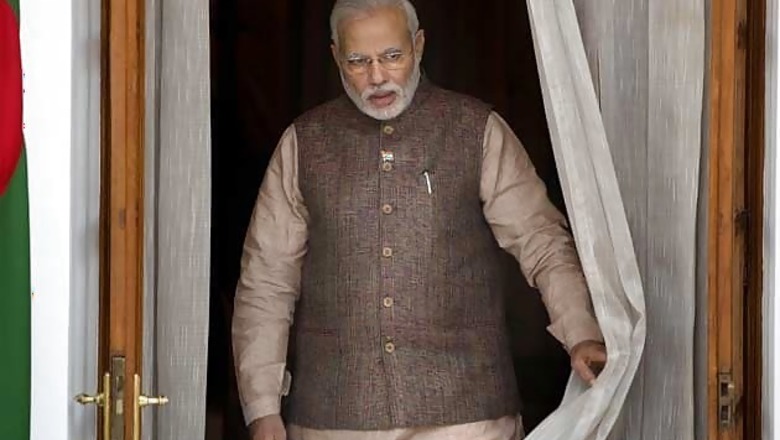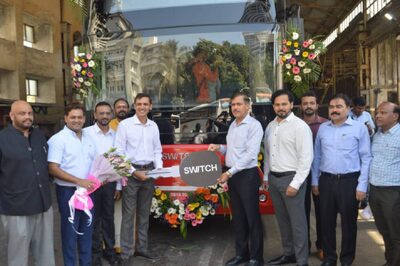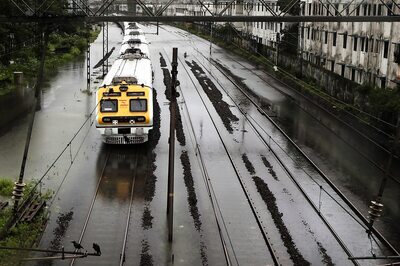
views
New Delhi: With Prime Minister Narendra Modi presiding over the first one-party majority government at the Centre in the last 30 years, the pall of gloom over the state of Indian economy is slowly lifting. The Sensex has been on an upswing ever since Modi powered Bharatiya Janata Party-led National Democratic Alliance won 335 seats. The BJP on its own won 282 seats in the 545-member Lok Sabha becoming the first party since the Congress in 1984 to command majority in the Lower House of Parliament.
Modi has already signalled that he is ready to do business with all the major powers of the world. He had invited all South Asian Association for Regional Cooperation (SAARC) leaders to his swearing-in ceremony. He has also reached out to Japan and China while the other major economic superpowers - the USA and Europe - too are looking at India with renewed interest ever since Modi took over as the Prime Minister.
The last five years have been a period of missed opportunities as the Congress-led United Progressive Alliance was burdened under coalition compulsions, massive corruption scandals, a weakening economy and policy paralysis.
But with BJP getting absolute majority and allies having very little power to arm-twist Modi, the government can go ahead with its major task of bringing the economy back on track. Several business leaders and foreign governments including the US have welcomed the new Central government and hoped that it will help improve the business scenario in the country.
US Congressman Ed Royce has said that Modi has "an opportunity" to not only reinvigorate India's economy, but also bring new energy to the Indo-US relationship.
"Prime Minister Modi's historic victory has granted him a mandate unseen in decades. If Modi is successful, far more Indians will have an opportunity to unleash their abundant economic talent and potential, as Gujaratis have. He now has the opportunity to reinvigorate India's economy and bring new energy to US-India relations," Congressman Ed Royce said.
Royce, Chairman of the powerful House Foreign Relations Committee and former Co-Chair of the influential Congressional Caucus on India and Indian-Americans, in an op-ed to the ethnic India West newspaper wrote that he is optimistic that the mandate given to Modi will help India thrive economically, lifting countless people out of poverty.
Praising Modi for his Gujarat model of development, Royce said under his leadership, Gujarat, home to a mere five per cent of the country's population, now accounts for nearly 25 per cent of all Indian exports.
"Modi's election as prime minister comes at a time when India's economy could use a boost. Once enjoying a GDP growth rate near 10 per cent, it is now growing at less than five per cent each year. Inflation also remains high due to bottlenecks in production and infrastructure, preventing companies from growing," Royce said.
"Adding to these problems, India has one of the fastest growing workforces in the world, and is currently able to create only two million jobs per year for the 12 million people entering its workforce. To meet these challenges, a pro-business, pro-growth leader is needed," he wrote.
Royce said it is likely that Modi will focus on private enterprise, reduced bureaucracy, and stronger trade ties with major partners. "Importantly, Modi met with Pakistani Prime Minister Nawaz Sharif on his first day as prime minister, stressing that the two sides could move trade ties immediately. These manoeuvres should help jumpstart India's economy, but importantly, they will also place a much needed focus on improved trade," he said.
"Since 2001, US-India trade may have doubled every five years, but our economic relationship remains far below the scale of our markets. The value of US-India trade is still only one-seventh that of our trade with China, despite warm relations and numerous shared values. Modi's commitment to cut the red tape that has long plagued our trade relationship gives reason for hope that our economic partnership will flourish," Royce said.
Observing that the US was late in engaging with Narendra Modi, an eminent American scholar has asked the White House to signal that it is ready to do business with the new Indian Prime Minister and reinvigorate bilateral ties.
"(The US) President (Barack) Obama should signal his willingness to meet with Modi in Washington on the heels of the September 2014 United Nations General Assembly. This would help set the foundation for improved ties and mend fences over the revoked visa issue," Lisa Curtis of Heritage Foundation said.
A known India expert, Curtis said there is an opportunity to move past recent irritants in the US Indian relationship and reinvigorate the ties between the two countries. "For this to happen, the Obama Administration must signal that it is ready to do business with newly elected Prime Minister Modi. If the US demonstrates its willingness to establish close ties with the new Indian government, it is likely that the BJP will reciprocate, and the two sides can refocus on achieving the vision of a durable and strategic partnership, which is in the national interest of both countries," Curtis said.
According to Curtis, the US should seek to work with the new BJP government to enhance India's role in demonstrating America's commitment to the Asia Pacific.
"Given the BJP's apparent interest in adopting a more assertive hedging strategy vis-a-vis China, the US will likely find more opportunities to engage with Indian officials on the US strategy in the Asia Pacific," she said.
"A BJP government will not be constrained or influenced by leftist-leaning politicians who have a knee-jerk aversion to strategic cooperation with the US, as was the Congress Party led government. BJP leaders will continue to resist any policy construed as 'containment' of China, however," Curtis said.
"Modi's strong equation with Japanese Prime Minister Abe also could open opportunities for greater trilateral cooperation among the US, India and Japan. The sixth trilateral US India Japan meeting, scheduled to take place in New Delhi in early June, presents an early opportunity for the new Indian government to demonstrate it prioritizes the dialogue," she added.
Calling to reinvigorate the Defense Trade and Technology Initiative (DTTI) between the Office of the Secretary of Defense and the Indian National Security Advisor, Curtis urged the Obama Administration to make a fresh push to clear hurdles for US companies to invest in India's civil nuclear sector.
"The US should encourage India's economic and political involvement in Afghanistan, which helps bolster the Afghan government s efforts to fight terrorism," she said.
Conventional thinking holds that the US can mitigate regional tensions by adopting a neutral or "balanced" position toward the sources of Indo Pakistani conflict and the tools each side employs to try to prevail in the conflict.
"But this approach has not served US interests when it comes to fighting terrorism. In fact, prioritising a policy of balance over principles in dealing with Indo Pakistani tensions has contributed to the growth of international terrorist threats emanating from South Asia," she argued.
Curtis said the US has squandered valuable opportunities in the past including in the aftermath of 9/11 and the 2001 2002 Indo Pakistani military crisis, and after the 2008 Mumbai terror attacks to encourage change in the Pakistani military's fundamental calculations on the use of terrorism to achieve foreign policy objectives.
Pakistan successfully argued that it was too weak to meet US counter-terrorism demands. This led US officials to soften their tone and accept continued ambiguous Pakistani relationships with known terrorist groups, Curtis said.
"The US will never fully get a handle on the international terrorist threat emanating from Pakistan if it allows Islamabad to continually link the activities of these groups to its dispute with India," she said adding that the US should no longer sacrifice its anti-terrorism principles in the region for the sake of pursuing an "even-handed" South Asia policy.
Modi massive win has also buoyed the IT/ITES industry which depends heavily on the US. The Indus Entrepreneurs (TiE) hopes that the Modi government will focus on the industry along with other sectors of the Indian economy and help is grow at a faster rate.
While the US is optimistic about ties with India, it has also criticised the country's poor record of protecting women. The United States has said it is "horrified" at reports of sexual violence and murders in India and it also applauded the role of individuals, government officials and civil society groups working to protect the survivors.
"Like so many in India, we were horrified to learn of these violent sexual assaults and murders. Our thoughts are with the victims families during this difficult time," State Department Deputy Spokesperson Marie Harf said.
Harf was responding to questions on the brutal gang rape and murder of two teenaged girls last week in Uttar Pradesh's Badaun district. "As we have said, changing laws and changing attitudes is hard work," she said.
However, Obama administration had praised the role of government officials along with civil society groups working to protect the survivors in the country.
"We applaud the many individuals, government officials, and civil society groups in India that are working to protect the survivors, to prevent gender-based violence, to help it try to change what is really hard to change," she added.
The former USIBC president, Ron Somers, said the urgent need of the hour is to double-down on law and order, particularly to protect women and to administer the law fairly to all sections of society.
"The headlines of the recent rape case are becoming all too frequent. This tragedy is a blight on all humanity, affecting all of us directly. The damage such an act perpetrates on India's image is real. Investors and travellers the world over hesitate and pause while considering basic safety," he said.
"Recognising that law and order is a state subject, and knowing that crimes of hate are acts of violence that respect no national borders, if only the central government could set a model example to spur best practices for keeping the peace, protecting the innocent across all of India, this is the urgent need of the hour", Somers said.
(With inputs from PTI)




















Comments
0 comment